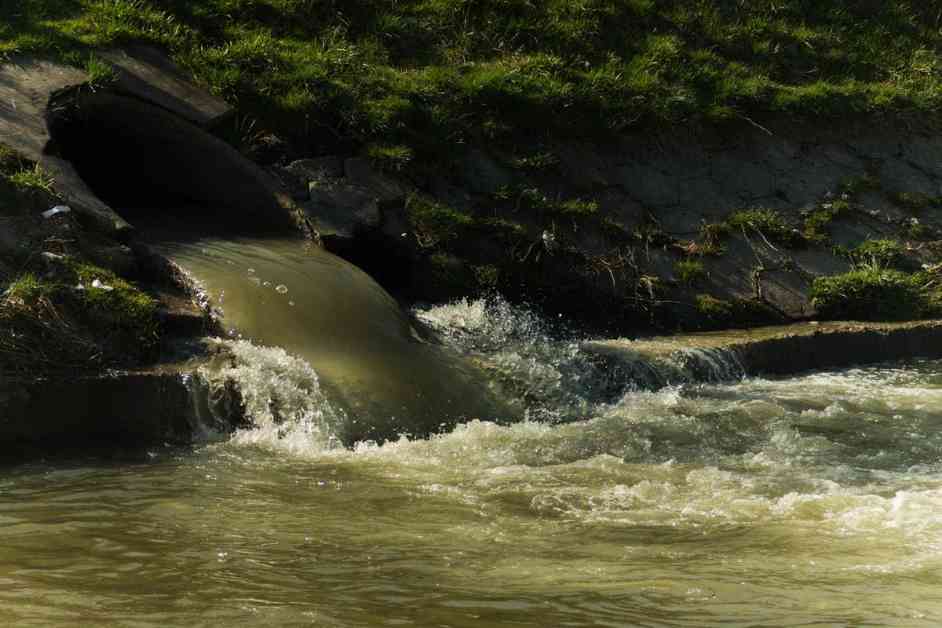Water companies in the UK are facing a major crackdown on pollution of the country’s lakes and rivers, with new legislation threatening executives with prison time if they continue to pump filth into waterways. Environment Secretary Steve Reed has announced the introduction of the Water (Special Measures) Bill, which aims to put an end to sewage and other pollutants being discharged into the environment.
The announcement comes in response to growing public outrage over the state of Britain’s waterways, which have been inundated with record levels of sewage and other harmful substances. Mr. Reed has made it clear that water executives will no longer be able to profit from polluting the environment, stating that those who refuse to comply with the new laws could face criminal charges and imprisonment.
In a speech delivered in Putney, London, Mr. Reed emphasized the need for immediate action to address the unacceptable behavior of water companies and their bosses. He highlighted the government’s commitment to reforming the water industry and cleaning up the country’s waterways for good. The Water (Special Measures) Bill represents a significant step towards achieving these goals, with provisions for tougher enforcement measures and stricter penalties for offenders.
Subheadings:
1. The Problem of Water Pollution in the UK
2. Impact of Polluted Water on the Environment and Public Health
3. Measures to Address Water Pollution and Hold Companies Accountable
The Problem of Water Pollution in the UK
The issue of water pollution in the UK has become a growing concern in recent years, with reports of sewage discharges and other pollutants contaminating rivers, lakes, and seas across the country. Water companies have come under fire for their role in exacerbating the problem, with incidents of illegal waste dumping and environmental violations making headlines.
Thames Water, one of the largest water companies in the UK, has been at the center of controversy for discharging billions of liters of sewage into the River Thames since 2020. This alarming revelation has raised questions about the company’s environmental practices and its commitment to protecting the waterways it serves. Similarly, South West Water (SWW) has faced fines for a series of environmental offenses in Devon and Cornwall, highlighting the widespread nature of the issue.
The impact of water pollution extends beyond the environmental realm, affecting public health and wildlife in significant ways. Contaminated water sources can lead to the spread of diseases, endanger aquatic ecosystems, and harm biodiversity. The need for urgent action to address this crisis is evident, as the consequences of continued pollution are far-reaching and potentially irreversible.
Impact of Polluted Water on the Environment and Public Health
Polluted water poses a serious threat to the environment and public health, with far-reaching consequences that demand immediate attention. The contamination of rivers, lakes, and seas with sewage and other pollutants can have devastating effects on aquatic ecosystems, wildlife, and the overall quality of the water supply.
In addition to harming marine life and disrupting delicate ecosystems, water pollution can also contaminate drinking water sources and pose health risks to humans. Exposure to contaminated water can lead to a range of health problems, including gastrointestinal illnesses, skin infections, and respiratory issues. Vulnerable populations, such as children, the elderly, and individuals with compromised immune systems, are particularly at risk of adverse health effects from polluted water.
The economic impact of water pollution is also significant, with costs associated with cleaning up contaminated waterways, treating polluted water, and addressing public health concerns. The tourism industry, which relies on clean and healthy water sources, can suffer from the negative effects of pollution, leading to loss of revenue and damage to local economies.
Measures to Address Water Pollution and Hold Companies Accountable
To address the issue of water pollution and hold companies accountable for their actions, the UK government has introduced the Water (Special Measures) Bill, which aims to strengthen enforcement measures and impose stricter penalties on offenders. The Bill includes provisions for the loss of bonuses, potential prison sentences for industry executives, and the requirement for water companies to cover the costs of enforcement.
Under the new legislation, water executives will be held to higher standards of accountability and face criminal charges if they fail to comply with environmental regulations. The government is committed to cracking down on polluters and ensuring that water companies prioritize the protection of the environment, their consumers, and their financial resilience.
In addition to punitive measures, the Water (Special Measures) Bill also includes provisions for independent monitoring of sewage outlets, real-time reporting of emergency overflows, and increased transparency in the water industry. These measures are designed to improve oversight, enhance regulatory enforcement, and promote greater accountability within the sector.
Overall, the introduction of the Water (Special Measures) Bill represents a significant step towards addressing water pollution in the UK and holding water companies responsible for their actions. By implementing tougher penalties, increasing regulatory oversight, and promoting transparency, the government is working to clean up the country’s waterways and protect the environment for future generations.












